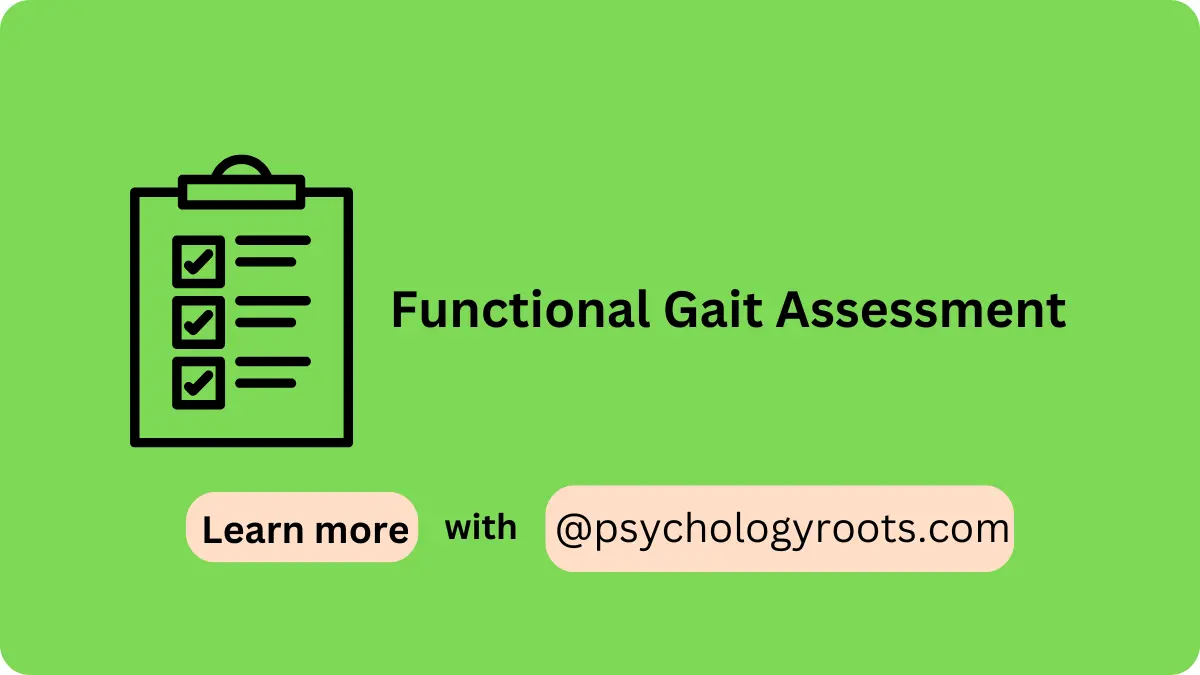Table of Contents
Functional Gait Assessment
Here in this post, we are sharing the “Functional Gait Assessment”. You can read psychometric and Author information. We have thousands of Scales and questionnaires in our collection (See Scales and Questionnaires). You can demand us any scale and questionnaires related to psychology through our community, and we will provide you with a short time. Keep visiting Psychology Roots.
About Functional Gait Assessment
Scale Name
Functional Gait Assessment
Author Details
Wrisley, D. M., Marchetti, G. F., Kuharsky, D. K., & Whitney, S. L.
Translation Availability
English

Background/Description
The Functional Gait Assessment (FGA) is a clinical assessment tool developed to evaluate postural stability and functional mobility during various walking tasks. It is an extended version of the Dynamic Gait Index (DGI), incorporating additional challenging tasks to improve sensitivity and reduce ceiling effects in higher-functioning individuals.
The FGA assesses gait function under various environmental conditions and is widely used for populations such as older adults, individuals with vestibular disorders, Parkinson’s disease, stroke, and other neurological impairments.
Administration, Scoring and Interpretation
- Preparation:
- A marked walkway of at least 20 feet.
- Required objects such as shoeboxes or cones for obstacles and stairs for specific tasks.
- Task Execution:
- The test includes 10 walking tasks, such as walking at different speeds, turning the head, stepping over obstacles, and navigating narrow spaces and stairs.
- Provide clear instructions for each task.
- Observation:
- Evaluate the individual’s gait adaptability, balance, and risk of falls during each task.
Reliability and Validity
- Reliability: Demonstrates excellent test-retest and inter-rater reliability.
- Validity: High internal consistency and strong correlations with other balance and gait measures, such as the Berg Balance Scale and Dynamic Gait Index.
Available Versions
10-Items
Reference
Wrisley, D. M., Marchetti, G. F., Kuharsky, D. K., & Whitney, S. L. (2004). Reliability, internal consistency, and validity of data obtained with the functional gait assessment. Physical therapy, 84(10), 906-918.
Important Link
Scale File:
Frequently Asked Questions
Q1: What is the purpose of the FGA?
The FGA assesses functional gait and postural stability during various walking tasks to identify fall risks and gait impairments.
Q2: How long does the FGA take to administer?
The test typically takes about 15–20 minutes to complete.
Q3: What populations can benefit from the FGA?
It is commonly used for older adults and individuals with neurological disorders, vestibular dysfunction, or other balance impairments.
Q4: What distinguishes the FGA from the DGI?
The FGA includes additional tasks, such as walking with narrow base gait and backward walking, making it more comprehensive than the DGI.
Q5: Can the FGA be administered without stairs?
Yes, but the absence of stairs limits the comprehensiveness of the test. Substitute tasks may be used cautiously.
Disclaimer
Please note that Psychology Roots does not have the right to grant permission for the use of any psychological scales or assessments listed on its website. To use any scale or assessment, you must obtain permission directly from the author or translator of the tool. Psychology Roots provides information about various tools and their administration procedures, but it is your responsibility to obtain proper permissions before using any scale or assessment. If you need further information about an author’s contact details, please submit a query to the Psychology Roots team.
Help Us Improve This Article
Have you discovered an inaccuracy? We put out great effort to give accurate and scientifically trustworthy information to our readers. Please notify us if you discover any typographical or grammatical errors.
Make a comment. We acknowledge and appreciate your efforts.
Share With Us
If you have any scale or any material related to psychology kindly share it with us at psychologyroots@gmail.com. We help others on behalf of you.